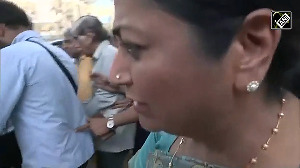'Not only are Muslim homes and shops being bulldozed, but the cops are filing random FIRs even against people who died two-three years ago, against those who have moved to neighbouring states since almost two years to work there.'
Saif ul Islam, one of the advocate-members of the Association for Protection of Civil Rights, who visited the riot-affected areas of Mewat for two-and-a-half days, tells Prasanna D Zore/Rediff.com about what he and other members of the APCR team discovered in the region which saw communal violence for the first time in many years at the end of the 84 Kos Parikrama Yatra which began July 4 with the onset of the month of Shravan in north India.
APCR, established in 2006, works for the protection of human rights of the deprived sections of society and include members who are advocates, journalists and social and human rights activists.
The Yatra Background And What Happened in Nuh

If you talk to the locals of Nuh, they will tell you that this yatra has been taking place for almost a century now.
The yatra is not something new. But for the past several decades the route of the yatra would pass through a passage considered sacred this pathway bypassed the Muslim-majority areas in the region.
But since 2021, after COVID, the yatra organisers, under pressure from the Bajrang Dal, changed the route. The sacredness and the concept of the yatra envisaged igniting awareness about Hindu temples that dot the Aravali hills in this region.
When you reach Medical Chauraha after passing through the Aravali Hills, the yatra would reach a huge gate of Shiv Temple at Nalhar.
But since 2021 the Bajrang Dal changed the route that would pass through Nuh junction and Jhanda Park, a locality where mostly Muslims reside. In 2021 too, there was some tension leading to stone pelting here. But the peace committee in the area immediately took in their hands and the situation was taken care of.
In 2022, the Muslim community leaders and locals even offered water and other refreshments to the pilgrims. But after the mob lynching of Nasir and Junaid (cattle traders from Rajasthan's Bharatpur) there was anger against Monu Manesar and Bittu Bajrangi in Mewat.

This yatra is mostly undertaken during the two-month period of Shravan and Shravan is almost over in north India. So, the yatra went on unhindered and peaceful for more than a month.
But during the fag end of this yatra a video was circulated on social media that these two would be part of the yatra. Even when this yatra entered in Nuh there were no clashes.
When the yatra entered Jhanda Chowk, Bajrang Dal volunteers who were part of this yatra started brandishing knives and swords and showcasing their martial skills; there is clear video evidence of these acts; to add to it there were already videos doing the round that Monu Manesar and Bittu Bajrangi would be participating in this yatra the next day.
Someone from the yatris started sloganeering hailing Monu Manesar which made the people of Nuh believe that Monu Manesar was part of the yatra on that day.
The pilgrims are allowed to carry only earthen pots filled with water, which is part of the customary religious ritual. Nobody had any permission to carry arms and stop amid a Muslim-dominated area and brandish them.
The cost of the gun that was fired by a Bajrang Dal activist from inside the Shiv temple is around Rs 1.30 crore (Rs 13 million). That video is already viral on social media.
It is true that people of Nuh were angry at Monu Manesar and Bittu Bajrangi over the murders of Junaid and Nasir and in the heat of the moment there began a clash. Both sides attacked each other.
When I spoke to both Muslims and Hindus -- and I have their audio-video testimonies -- of the area they told me that the Muslims who beat the sloganeering activists of the Bajrang Dal were outsiders.
While the Muslims did bash up these people they did not use any weapon or arms to attack them. When they (Bajrang Dal volunteers) realised that they were getting beaten up they resorted to firing from guns.
People from the yatra ran in different directions towards Palwal, Sohna, Gurgaon.
As a reaction the cops started randomly detaining people. Till date, 246 arrests have been made throughout Haryana, out of which 146 Muslims from Nuh have been arrested.
Why Gurgaon Is Seeing Action Against Rioters
The very same night, the activists who had fled towards Gurgaon indulged in violence in the city by burning down a disputed mosque.
There was a dispute over this mosque since 2003, but in 2011 the Supreme Court passed an order allowing construction of this mosque. But Hindutva organisations always had an eye on this structure as a disputed mosque.
The police commissioner of Gurgaon told me that the city police filed 23 FIRs and arrested 55 Hindus over violence in the city.
Gurgaon being the financial capital of north India, it was imperative that stern action be taken against the culprits as the city has witnessed huge financial losses due to the violence.
The transportation sector suffered huge losses with a decline of 28 per cent in just two days after violence began.
Now, in the aftermath of this violence many companies have asked their employees to work from home and many are planning to move their offices.
For good, the CP is under pressure to act against those who participated in violent activities in Gurgaon. But in Nuh, the situation is very different.
Not only are Muslim homes and shops being bulldozed but the cops are filing random FIRs even against the people who died two-three years ago, against those who have moved to neighbouring states or cities since almost two years to work there.
Scared of such actions many Muslims from Nuh escaped to the Aravali hills and went into hiding.
Beyond the Aravali hills, on the other side is Rajasthan. Many people from Nuh have their relatives there. 32 per cent of Mewat region is in Rajasthan and the rest is part of Haryana.
The dairy farming industry, mostly dominated by Muslims in Nuh, has suffered the maximum loss because of the riots and violence here. More than 300 litres of milk has rotten and people here are just throwing it down the drains.
The womenfolk milch cows and their men transport it to the markets on their bicycles and scooters. This business is totally in dumps today as many men engaged in this industry are either under arrest or have escaped wherever they could find safety.











 © 2025
© 2025